#greek myth retelling problems
Text
Look, I hung back and let these Greek myth retellings character assassinate Apollo, but now they're advancing on my boys Dionysus and Perseus and I'm not gonna stand for that. The absolute disrespect to a god whose majority of followers were women and to a Greek hero whose whole motive to go on a quest was to protect his mother from a marriage she didn't want.
The gall, the audacity, the gumption, the complete and utter willfully ignorant misunderstanding of these characters. There are plenty of other male characters to turn into two-dimensional misogynist caricatures. Do those. Try Agamemnon for the fiftieth time. You could actually manage to strike a few points of accuracy there while blindfolded.
#greek mythology#greek myth#greek myth retelling problems#i used to be excited for all these feminist greek myth retellings now i'm just jaded and disappointed#back the fuck away from my boys#of all the characters to villainize in your feminist retelling why these?#perseus was just a kid trying to protect his mom#perseus defense squad#ramblings of a classicist#psa from your grumpy neighborhood classicist#i'm starting to worry a good chunk of these feminist retellings are just corporate white feminist retellings and that concerns me#many of these authors have backgrounds in classics too but like were we even reading the same texts?#woke up on a sunday morning wanting to fight apparently
18 notes
·
View notes
Text
genuinely can’t believe people are saying “Annabeth was bad in ep3 because real actual book accurate Annabeth would never be indecisive ever once” SHE’S TWELVE AND HAS ADHD DUMBASS!! Adhd indecision isn’t “I can’t make choices” it’s “im buying ice cream but there’s 10+ flavors and I want to sample everything at least twice before I make a choice but the ice cream store employee probably won’t let me plus that’s rude plus I’m holding up the line and my friends are waiting to pay and so everyone in the world hates me which means I should just get no ice cream except if I do that then I’m going to be sad when everybody else has ice cream but I can’t make a choice and if I pick this flavor I can’t get that one and what if halfway through I realize I want strawberry but I already got chocolate so then I’m stuck with chocolate ice cream and-“
#adhd life#my adhd#adhd problems#adhd brain#adhd things#greek myth retellings#percy jackson adhd#percy and annabeth#pjo disney+#adhd annabeth#annabeth chase#annabeth pjo
76 notes
·
View notes
Note
This isn’t really a tips question, but what does a hades and persephone retelling mean? Like I know they’re Greek gods but not much more than that.
Hades x Persephone Retelling
The original Hades x Persephone mythology runs like this:
Hades (god of the Underworld) kidnaps Persephone (daughter of Demeter, the goddess of Agriculture)
Persephone's mother Demeter goes to look for Persephone but when she realizes that her daughter was whisked away to the Underworld, Demeter falls in despair. Due to the goddess's sadness, the land that was fertile beame barren and food becomes scarce.
Zeus strikes a deal with Hades that Persephone would stay with him for 1/3 of the year and the rest with her mother.
When Persephone goes to the Underworld, Demeter would mourn her daughter, giving rise to winter. When the mother and daughter are reunited, crops will grow once more, giving rise to spring and summer.
The themes in this story would be:
Cycle of life and death (the seasons)
Hades x Persephone's marriage is actual considered one of the most stable in Greek mythology (Hades stays relatively loyal to her and they have mutual fondness)
The power Persephone has: she is a bright, lively girl and a powerful Underworld Queen at the same time
Transformation Persephone goes through (from being a girl to being a married woman)
Modern retellings of Hades x Persephone would expand on these story themes.
Neon Gods (Dark Olympus, #1)
A Touch of Darkness (Hades & Persephone, #1)
Promises and Pomegranates (Monsters & Muses, #1)
─── ・ 。゚☆: *.☽ .* . ───
💎If you like my blog, buy me a coffee☕ and find me on instagram!
💎Before you ask, check out my masterpost part 1 and part 2
💎For early access to my content, become a Writing Wizard
#writing#writers and poets#writers on tumblr#writeblr#helping writers#poets and writers#let's write#creative writing#creative writers#resources for writers#writing practice#writing prompt#writing community#writing advice#writing ideas#writer#on writing#writing inspiration#writer stuff#writer on tumblr#writer things#writer community#writer problems#writerscommunity#writblr#hades persephone#retelling#fiction#greek mythology#greek myth retellings
33 notes
·
View notes
Text




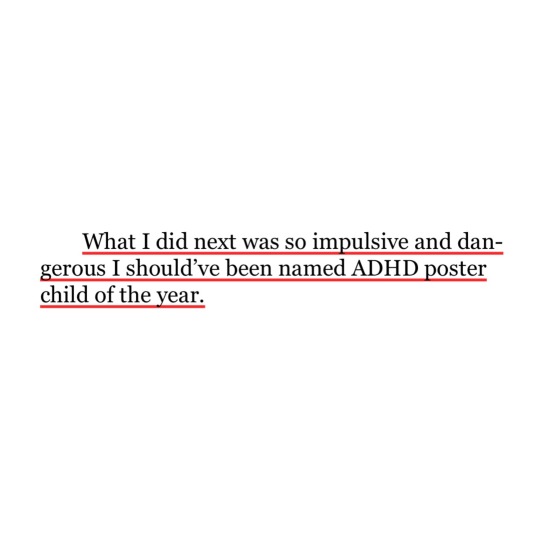
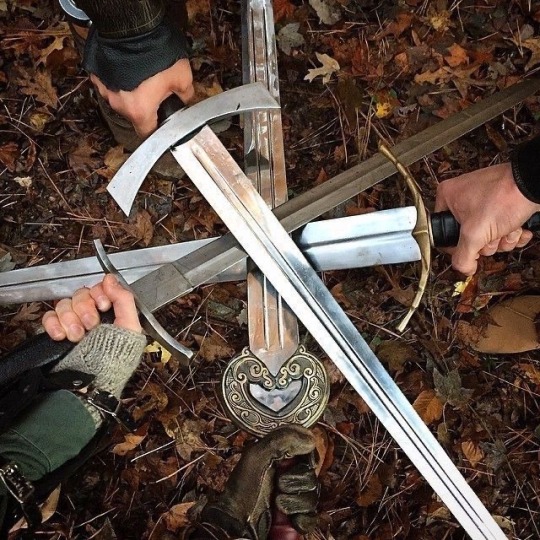
📖: 𝑻𝒉𝒆 𝑳𝒊𝒈𝒉𝒕𝒏𝒊𝒏𝒈 𝑻𝒉𝒊𝒆𝒇 (𝑃𝑒𝑟𝑐𝑦 𝐽𝑎𝑐𝑘𝑠𝑜𝑛 𝑎𝑛𝑑 𝑡ℎ𝑒 𝑂𝑙𝑦𝑚𝑝𝑖𝑎𝑛𝑠 #1) 🌊⚔️⚡️
✍🏽: 𝐑𝐢𝐜𝐤 𝐑𝐢𝐨𝐫𝐝𝐚𝐧
Get the book! 🌟
#the lightning thief#percy jackson#percy jackson and the olympians#rick riordan#annabeth chase#groover#percy x annabeth#percabeth#greek mythology#greek myth retellings#greek gods#camp halfblood#the chosen one#adhd problems#adhd#uncle rick#tio rick#greek monsters#pjo series#pjo#pjo stuff#fantasy#urban fantasy#childrens books#young adult#books recommendations#new books#books#books recs#libros recomendados
172 notes
·
View notes
Text
I don't know why I decided I needed to theme an entire extensive superpowered family after Greek gods and myths, but trying to figure out how to tie some elements of their stories into the characters is exhausting.
The one I'm currently doing? Zagreus. I don't know why, I only know the basics of his myth and I lowkey hate him. His big thing is that he gets reincarnated into another god because his dad swallowed his heart whole before having sex. What am I supposed to do with that? (Aside from give him the power to heal himself completely as long as his heart is still whole, because I already did that and then added in something even more demented in that he cuts out his heart to store it safely the moment he finishes reviving.) Anyway, I named him Zane. A name I currently as irrationally annoying as this character that I created.
I still need an alterego name though, so suggestions are welcome. It doesn't have to be anything to do with the myth, I might actually prefer it if it doesn't.
#greek mythology#writer problems#writing#writing help#why did i do this to myself#greek myth retellings#creative writing#character help#my brain is a burned scrambled egg right now#i hate this#i made it but i hate it#superhero story
1 note
·
View note
Text
im still kind of in disbelief that that the internet like...turned on lore olympus. i get the whole "once something is popular people make it their personality to hate something", and the "incredibly online people make age gap discourse about immortal gods bc they need to touch grass," and you're certainly not obligated to like it, it's not everyone's cup of tea, but like. it is a genuinely good comic. its issues are no worse than like, most serialized web comics that have to struggle with the medium, and its art style is engaging and interesting, and has improved a lot over time. i know there was a very t*rf-led movement on here a LONG time ago starting discourse about greek myths to get crypto t*rf shit about femininity across and i know thats where some critiques come from. and it's weird that many criticisms of "modern retellings" get blamed on lore olympus bc it doesnt actually follow them - like, demeter isnt some crazy bitch, she's a character with complexity and depth.
yes the original intent of the story is changed, a story that women in ancient times could relate to about the fears of marriage, but LO actually does what modern retellings of old stories do best - modify a story to serve a similar purpose, but reflecting the modern audience's contemporary issues. in this case, embracing the complexities of love and marriage as a survivor of sexual assault, something many modern women struggle with. persephone's relationship with demeter ALSO reflects a very real struggle many modern young women have, of finding identity and sexual agency as an adult when your entire life has been controlled by a helicopter mother, even with the best intentions, and with her own trauma.
i also find the criticisms of the body types and sexuality often misogynistic and weird - people want things with a distinct, interesting style, they want women with sexual agency to be promoted and not sanitized, and yet LO gets over-criticized. how persephone dresses, how the other gods dress, changes a lot depending on level of confidence, mood, etc, and is a part of the storytelling in an interesting way. you don't have to like it, and i know there's jokes about the LO art style of drawing women, but i have a body like some of those bodies. i know other people who do, or at least similarly. it's not like a lot of comics or manga or anime where everyone is a stick, and they get to be sexy! it's nice!
and when people complain that its the only webcomic people read well then thats a YOU problem. i read a LOT of webcomics. i talk about them to people, i recommend them. romantic and otherwise. do you? do you spend as much time complaining about lore olympus as you do talking up other cool webcomics that deserve attention?
779 notes
·
View notes
Note
What is the thing you feel like Lore Olympus failed at or did the worst. The comic has a magnitude of problems but what is one problem that you have the most hatred for or just flat out makes you angry?
(Just curious)
There are so, so many things I could point to as "the worst" thing that the comic did, because it has a LOT of worsts, but I think ultimately the failing of the original myth's messaging has to take the cake because it's ultimately the root of all of LO's problems.
Rachel herself seems to have this disconnect between what's going on in her head vs. what she's actually writing. It's especially present in her Q&A's and interviews where she claims certain things about the comic / text that just aren't present in the slightest during the actual comic. One such example that ties into my answer is this response she gave to Girl Wonder Podcast:
"I feel like female characters in general, people will be a little harsher on them and sometimes way harsher on them, and I used to be like.. before I started writing the story and like making a story I was like yeah, sexism is not that bad, and [now] I was like oh it's bad. It's quite bad [laughs], so like, I don't know, I feel like the female characters in the story don't get so much of a pass. But this isn't consistent across the board, it's not all the time"
It's ironic at best and tone deaf at worst that she would claim that it's her audience being harsh on the female characters, when she's the one who wrote them into the characters they are that would get that reaction. Minthe had her BPD retconned so now she's just the abusive other girl. Hestia was turned into a cruel hypocrite when it was revealed she was a lesbian. Hera is racist to nymphs and cruel to the lower class and yet she's still rewarded in the end by getting to run off with a nymph girl who we've never seen her have any extended interaction with. And worst of all, Demeter was robbed of all of her agency all in favor of turning her into the evil Mother Gothel mom who's overbearing and cruel to poor Persephone. Some of these women deserve to be called out (Hera and Hestia), and others like Minthe and Demeter were simply used as props to do exactly what Rachel claims she doesn't like people doing and is labelling as sexism - to get harsh reactions and give the audience someone to hate on. Rachel desperately needs to learn to read her own work. Her audience is "sexist" towards these women because Rachel wrote them that way.
It fucking sucks and it's, ngl, extremely disrespectful to the messaging of the original myth that was written to comfort and empower the mothers who had lost their daughters to marriages back in the day. It wasn't some simple "aww the girl moved out and now she doesn't visit anymore!" girls who got married off were often literally never seen again and it wasn't by choice. Not only that, but in certain regions (such as in Athens) the women were isolated to their own section of the house upstairs (while the men lived downstairs) so that they wouldn't be seen by visiting guests or strangers.
It's why in some cultures the original H x P myth was considered a "golden standard" for marriages (at the time) because not only was Persephone given power over the domain alongside Hades, but she actually did get to see her mother - but it wasn't because Hades was just such a kind guy who would let her go willingly, it's because Demeter had to literally hold the world hostage and fight for her right to reunite with her child.
So for LO to not only twist Demeter's love and justifiable concern for her daughter into "helicopter parenting", but also rob her of her agency and power in fighting for her child, it fundamentally misses the entire point of the original myth and undoes itself as a retelling that's trying to be taken seriously in the discussion of Greek myth media. And for that, Rachel should be ashamed of herself.
#ask me anything#ama#anon ama#anon ask me anything#lore olympus critical#anti lore olympus#lo critical
207 notes
·
View notes
Text
What Non-Pagans Need to Know About Fiction Featuring Pagan Gods
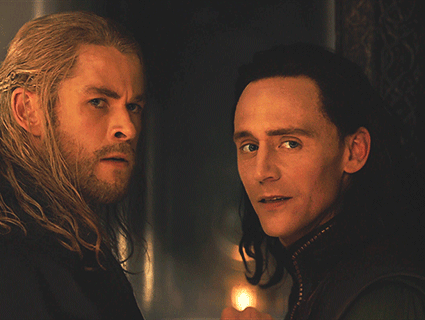
In light of Marvel's Loki show dropping a second season and a new Percy Jackson series on the horizon, I want to say some things about how fandom spaces can be respectful of real-life pagan religion.
Let's get one thing out of the way: literally no one is saying you can't enjoy fiction that uses pagan gods and heroes as characters. No one is saying, "Stop writing stories about our gods." In fact, many ancient cultures wrote fiction about their gods -- look at Greek theater or the Norse Eddas. The act of writing fiction about the gods is not offensive in itself.
But please remember that this is someone's religion.
The gods are not "just archetypes." Their myths are not "just stories." Their personalities are not a matter of artistic interpretation. For many pagans, the gods are very much real in a literal sense. I don't think Thor is a metaphor or a symbol -- for me, Thor is a real, autonomous spiritual being who exists outside of human perceptions of him, and who I have chosen to build a relationship with. Even if you are a hardcore atheist, I would hope you could at least be respectful of the fact that, to many modern pagans, the gods are both very real and very important.
When authors are not respectful of this fact, they reduce the gods, these very real objects of worship, to fictional characters. And here's the thing about fictional characters: they are fundamentally tools for authors to use to draw a desired emotional response from an audience.
Dracula's personality and behavior is wildly different depending on who is writing him, because different authors use Dracula to create different reactions in their audiences. In the 1931 film starring Bela Lugosi, he's equal parts alluring and disturbing, a symbol of America's mixed desire and disdain for foreigners. In Nosferatu, he's more strictly frightening and disgusting. In Francis Ford Coppola's movie, he's a tragic, romantic figure clinging to the last scraps of his humanity. In Netflix's Castlevania, he's an incredibly powerful being who has grown bitter and apathetic in his immortality. All of this is Dracula, and all of it is fine, because Dracula is not and never has been a central figure in anyone's religion.
Let's take a look at what happens when authors give this same treatment to real gods:
In Hellenic polytheism, Apollo is one of the most beloved gods, both historically and today. Apollo loves humanity, and humanity loves him back. He is the god of sunlight and of medicine, but also of poetry and song. He is one of humanity's most consistent defenders when one of the other gods gets wrathful. And while he does have dangerous or wrathful aspects of his own (he's also the god of disease, after all), he's also kind and soft with humanity in a way other gods often aren't, at least in some historic sources.
In the Lore Olympus comic series, Apollo is a villain. He's characterized as an abuser, a manipulator, and a violent man child. LO!Apollo is downright hateful, because the author wants us to hate him. Lore Olympus is a retelling of a myth about an abduction and forced marriage. Lore Olympus is also a romance. In order to get the audience to sympathize with Hades and root for his relationship with Persephone, Rachel Smythe needed to make someone else the villain. Apollo is the most obvious and extreme character assassination in Smythe's work, but several other gods (notably Demeter) also get the asshole makeover to tell the story Smythe wants to tell.
Here's where this becomes a problem: Hellenic polytheism is a fairly small religious community, while Lore Olympus is a massively popular webtoon with 1.3 billion views as of August 2023, print books available from major retailers, a TV adaptation in the works, and a very active online fandom. Rachel Smythe currently has a MUCH bigger platform than any Hellenic polytheism practitioner. Smythe and other authors are shaping how modern culture views the Hellenic gods, and that has a very real impact on their worshipers.
This means "Apollo is an abusive asshole" is becoming a popular take online, and is even creeping into pagan communities. I've personally seen people be harassed for worshiping Apollo because of it. I've seen new pagans and pagan-curious folks who totally misunderstand the roles Apollo, Hades, and Persephone play in the Hellenic pantheon because of Lore Olympus and other modern works of fiction.
There are tons of other examples of this in modern pop culture, but I'll just rattle off a few of the ones that annoy me most: Rick Riordan depicting Ares/Mars as a brutish asshole hyped up on toxic masculinity; Rick Riordan depicting Athena as a mother goddess; Marvel depicting Thor as a dumb jock; Marvel depicting Odin as a cold, uncaring father; DC depicting Ares as purely evil; whatever the fuck the Vikings TV show was trying to do with seidr; the list goes on.
All of these are examples of religious appropriation. Religious appropriation is when sacred symbols are taken out of their original religious context by outsiders, so that the original meaning is lost or changed. It requires a power imbalance -- the person taking the symbols is usually part of a dominant religious culture. In many cases, the person doing the appropriation has a much bigger platform than anyone who has the knowledge to correct them.
When Rick Rioridan or Rachel Smythe totally mischaracterizes a Greek god to tell a story, and then actual Hellenic pagans get harassed for worshiping that god, that's religious appropriation.
Religious appropriation is a real issue. This isn't just pagans being sensitive. To use an extreme example: Richard Wagner and other German Romantic authors in the 19th century used the Norse gods and other Germanic deities as symbols in their work, which was a major influence on Nazi philosophy. Without Wagner, the Nazis would not have latched onto the Norse gods as symbols of their white supremacist agenda. To this day, there are white supremacist groups who claim to worship our gods or who use our religious imagery in their hate movement. We are still reckoning with the misinterpretation of our gods popularized by Wagner and other German Romantics almost 200 years ago.
Again, no one is saying you can't enjoy fiction based on pagan mythology. But there are a few things you can do to help prevent religious appropriation in fandom spaces:
Above all else, be mindful that while this may just be a story to you, it is someone's religion.
Recognize that enjoying fiction based on our gods does not mean you know our gods. You know fictional characters with the same names as our gods, who may or may not be accurate to real-life worship.
Do not argue with or try to correct pagans when we talk about our experience of our gods.
Don't invalidate or belittle pagan worship. Again, this mostly comes down to recognizing that our religion is totally separate from your fandom. We aren't LARPing or playing pretend. Our sacred traditions are real and valid.
If you see other people in your fandom engaging in religious appropriation, point out what they are doing and why it isn't okay.
Please tag your fandom content appropriately on social media. Always tag the show, movie, book, etc. that a post is about in addition to other relevant tags. This allows pagans to block these fandom tags if we don't want to see them and prevents fandom content showing up in religious tags.
For example, if I'm posting about Athena from the Percy Jackson books, I would tag the post #athena #athenapjo #percyjackson #pjo. You get the idea.
And if fiction sparks your interest and you want to learn more about the actual worship of the gods, you can always ask! Most pagans love talking about our gods and trading book recs.
If you are writing fiction based on real mythology, talk to people who worship those gods. Ask them what a respectful portrayal would look like. If possible, include a note in your finished work reminding audiences that it is a work of fiction and not meant to accurately portray these gods.
#btw hades is also not a villain in helpol#this post is just mostly discussing how lo villiainizes apollo#shoutout to my roman pagan husband for proofreading and offering feedback#this post is Approved By The Council#psa#long post#paganism#pagan#paganblr#heathenry#norse heathen#norse paganism#inclusive heathenry#hellenic polytheism#helpol#religio romana#roman polytheism#roman pagan#marvel#mcu#loki series#loki season 2#percy jackson#percy jackson and the olympians#pjo#lore olympus#religious appropriation#my writing#white supremacy mention#white supremacy tw
342 notes
·
View notes
Note
Hello, thank you for your hard work, you page is really useful!
I’m looking for some Hades and Persephone AU fics since I’m obsessed with the idea of our favorite angel and demon as Greek gods, but I suck at scrolling through Ao3 tags. Is there any chance you can find them?
Hi. There is an Inspired by Hades and Persephone (Ancient Greek Religion & Lore) tag on ao3. Combine that with a Good Omens tag of your choice and you will only have a couple of pages to look through. Here's a selection...
beneath the weigth of the goodness by ashms (E)
A retelling of the myth of Hades and Persephone.
The Underworld god Crowley falls in love with the god of agriculture Aziraphale and abduct him.
Pomegranate Seeds In Your Heart by WaitingToBeBroken (T)
Persephone/Hades AU
In which Crowley is the god of the Underworld, calls Aziraphale 'petal' and is his normal protective and oblivious self.
Enter Aziraphale, the god of spring, whose only problem with visiting his friend is that he is not allowed to eat anything. Throw in the fact that he can make flowers grow from underneath his feet but is, also, very oblivious to their meaning and you get a fluffy retelling of our most beloved myth.
Of Roses and Pomegranates by pilatesandpinot (E)
Flower nymph Aziraphale is about to take her vows of maidenhood in honor of the goddess Artemis, but she can’t bring herself to turn her back from the dryad who’s captured her heart, Crowley. To be with the one she loves and redefine her destiny, Aziraphale runs into the dark forest of Arcadia, where Crowley serves as a guardian, and makes the ultimate vow.
A retelling of the Hades and Persephone myth.
The Myth of Aziraphale by Shay_Moonsilk (E)
“I didn’t really Fall,” Crowley reflected, twisting the apple about in his hands. “Just, you know. Sauntered vaguely downwards.”
“Downwards, into ruling the Underworld?” Aziraphale asked, unable to keep the dubiousness out of his voice. He kept his gaze on the demon’s face, lest he be tempted to eat the apple and seal his fate to Crowley. It did look rather tempting.
The King shrugged and said, “Promotions come easy to me,” and took a large bite, though it was Aziraphale himself that felt devoured.
---
Armageddon never happened. Crowley is the King of Hell. Aziraphale doesn't want to get married to an angel he doesn't love. Perhaps time in the underworld will help them find the answers they need.
When Earth Freezes Over by WorseOmens (NR)
When Earth freezes over, it’s springtime for the Underworld — but it wasn’t always that way.
Aziraphale, God of Spring, was once isolated from the other gods by his overbearing mother. Crowley, God of the Underworld, wanted him to take the freedom he deserved — and all it took, in the end, was a little piece of fruit, and a lot of temptation.
(Good Omens Hades & Persephone AU)
The God Below by ChubbyHornedEquine (M)
In order to have good crops, a spring & summer, every year someone is sacrificed to The God Below. (Hades/Persephone/A dash of beauty and the beast inspired AU.)
- Mod D
77 notes
·
View notes
Text
I would really greatly appreciate it if people who aren't actually Classicists would stop talking about having to relearn Classics as if they themselves are the experts. Like I can concede you have points, but you seriously lack the wider context to properly integrate them into the thing you're talking about while respecting those stories as part of an ancient culture.
#greek myth retelling problems#greek myth#greek mythology#i'm taking the classics away from you until you know how to properly play with them#psa from your grumpy neighborhood classicist#ramblings of a classicist#i used to be excited for all these feminist greek myth retellings now i'm just jaded and disappointed#y'all we can write feminist retellings without completely villainizing ancient greek heroes and men#i'm telling you it'll be fun if you just try it#think of all the complex characters you'll have#isn't that what you've all been begging for for years? complex characters?
5 notes
·
View notes
Note
hey there, would you mind telling me a bit about Lilith and your practice with her? I’ve been trying to do some research on her modern worship, offerings, and signs, but it can be really difficult to find anything that’s serious when there are so many references to her in pop culture :/
Okay so Lilith is extremely, and I mean extremely complicated.
Contrary to popular belief, “Lucifer” isn’t actually a name, but a title. The name Lucifer means “light bringer” in reference to Venus as she appears in the morning, but any “light bringer” can be considered a Lucifer. Prometheus for example, the man who stole fire from the Gods to give light to humanity, is a Lucifer. And so, there are actually many different entities that have taken the role of a Lucifer throughout history and in various different retellings. Eosphorus is the name of the deity that was revered by the Greeks as Venus, but Lucifer is a title that many different figures have taken on depending on the context.
Why do I bring up Lucifer? Because he and Lilith are very similar in that regard. Our earliest mentions of Lilith throughout history paint her not as an individual but as a species of night demon that frequently takes the form of an owl, she was known to bring crib death and miscarriage.
In the myth, Inanna and the Huluppu tree, a huluppu tree (a type of willow) is planted by the banks of the Euphrates River. The tree is tended and nurtured by the goddess Inanna, who plans to use its wood to craft a throne and a bed for herself. However, as the tree grows, it becomes infested with three troublesome creatures:
A serpent that makes its home at the roots of the tree. (What troublesome serpents have been portrayed in another mythology having to do with magical trees? HMM!)
The Anzu bird (sometimes described as a mythical lion-headed eagle) that builds its nest in the branches.
The Lilitu (a female demon or spirit) that makes her lair in the trunk.
Inanna, distressed by these creatures occupying her tree, calls for help from her brother, the sun god Utu (or Shamash). When Utu does not assist her, she turns to the hero Gilgamesh. Gilgamesh comes to her aid and, with his great strength, drives away the serpent, the Anzu bird, and the Lilitu. He uproots the huluppu tree and uses its wood to craft a throne and a bed for Inanna, fulfilling her original intention. Consider that it is a human, not the God of the sun, who helps Inanna with this problem. Interesting.
The inclusion of these three very specific creatures occupying this important tree tended to by the Goddess of love, to her dismay, are very important. Especially when he consider how Inanna’s visual depictions have been syncretized with Lilith. The idea of a serpent (perhaps a Lucifer) , an Anzu bird (described quite similarly to some depictions of abrahamic angels, specifically those like the cherubim) and a Lilith being “driven away” from this mythical tree are notable, especially because these are all symbols associated with Inanna herself.
Inanna, one of the most complex deities in Mesopotamian mythology, embodies aspects of fertility, love, war, and the underworld. Inanna's association with snakes can be seen in her connection to the underworld and her transformative journeys. In her descent into the underworld, Inanna removes one magical garment as she continues into the deathly realm. Just as the snake sheds its skin, Inanna sheds her power and identity as she descends, only to be reborn and restored.
Inanna is frequently depicted with wings, highlighting her divine nature and authority. The Anzu bird in the Huluppu Tree myth, while initially a source of trouble, also connects to the theme of overcoming chaos, which aligns with Inanna's role as a powerful deity who brings order.
Lilith, often depicted as a demoness, represents untamed feminine power, independence, and sometimes chaos. In later Jewish mythology, she is considered a night demon, but her roots trace back to earlier Mesopotamian beliefs. Her inclusion in Jewish mythology is summed up in the verse Isaiah 34:14: "Wildcats shall meet with hyenas, goat-demons shall call to each other; there too Lilith shall repose, and find a place to rest." (Hm… I wonder WHERE she will find a place to rest? Perhaps in a… magical tree?)
In Jewish mysticism, the feminine side of the tree of life is what creates the potential for evil. Even though it is the lightest, brightest, goodest form of feminine energy, for some reason, every time, disobedience pops up no matter what we do. It is an aspect of the feminine itself.
In the Huluppu Tree myth, Lilith (or a Lilitu) makes her home in the tree that Inanna nurtures. This connection reflects Inanna's association with both nurturing and taming wild, untamed aspects of the feminine. Lilith's presence in the tree also highlights the tension between order and chaos, which Inanna must navigate and control.
So what does this all mean?
Each creature in the tree draw direct parallels to the Goddess of Love herself. These can be interpreted as perversions of her divine nature, that she herself cannot be-rid of on her own. Inanna the Goddess of WAR couldn’t get an owl, a big bird, and a snake out of a tree??? Why? Likewise, why did the divinities refuse to help her? Why did she have to seek out a human specifically, to get those unwelcome guests out of her tree? And if it is so that Inanna just doesn’t really like owls and snakes, why is she represented with them (and generally just hanging out with them) so often?
Lilith, the serpent, and the Anzu bird reflect aspects of the divine mother that she herself cannot even tame. Lilith as the night owl also reflects an aspect of knowledge and wisdom, as owls can see in the dark and hunt strategically. Even though she is portrayed as an enemy of Inanna, Inanna never once can or even tries to harm her. Inanna being the Goddess of fertility, and Lilith being the demon that causes miscarriage, show that they are natural opposites, yet still derived from the same divine source, and never combative towards each other.
Similarly, Lucifer’s first ever depiction was as his role as Venus, the same astrological planet as what is associated with Inanna. In Christianity, Lucifer played the role of the serpent who convinced Eve, another archetype of divine femininity, to eat the forbidden fruit of knowledge. Interestingly enough, Lilith is never actually portrayed eating the fruit. Does she posses a divine knowledge that is inherent to her qualities as a night owl, to the point where she didn’t need to eat the fruit to have the wisdom to disobey Adam? Does she possess a knowledge that is inherent to the divine feminine force from which she was created? Is this because she was created from the divine forces of femininity itself and not derived from man, as Eve was? If this is the case, that even though Eve ate the apple, she did not become a Lilith, that stands to imply that there is an inherent quality about being derived from a human man, that repels or deflects that inherent feminine rebellious quality. Instead, being replaced with the the ability to submit.
Knowledge applied with the associations of night and mystery, create a feminine energy that cannot submit, and this is likely Inanna’s fault herself, as she very notably has a big issue with respecting any authority higher than herself, even death herself (as her big sister)
From a symbolic standpoint this tells us a couple things about Venusian energy in general.
1.) Regardless of how hard it tries to behave, it is inherently chaotic
2.) It has many faces, some of which do not jive with eachother, but even so, they continue to coexist, even if not in the same places
3.) It is a creator and a destroyer.
4.) It has a very rough time with the concept of submission.
Okay YAP fest, what’s the point?
Lilith is a great example of how the dark feminine exists within the light feminine as an inevitability. Lilith is not so much associated with war, the strategic enactment of violence., but rather the inherent unpredictability of femininity. Women both create life and snuff it, women can decide to procreate or to have an abortion. Lamashtu and Lilith respectively were invoked for abortive purposes.
And of course, Lilith’s adoption by feminist spaces as a self actualized protector of individuality and feminine rage also invoke heavy associations with Inanna as the Goddess of war. So in my interpretation, Lilith is that part of Inanna that went a little unchecked for a little too long. That combined with the themes of Lucifer’s liberation, paint a very interesting narrative about how femininity as a divine force shows up in obscure ways, perhaps even negative ways, whilst still being just as divine and inherent. To recognize Lilith as the antithesis of all of these things, is to see her as the unwavering aspect of femininity that cannot be tamed, even by femininity herself. The snake, the reborn, will always cause chaos at the root of the feminine energy. The Anzu bird, the angels, are susceptible to that same corruption. And the Lilith herself will always find a home within that feminine energy, unless of course, she is snuffed by the will of a man who doesn’t respect her. Still, she does not die, just searches for another place to rest.
Wow this was really long. SO. Lilith is the entity that embodies our biggest fears about femininity and the inherent knowledge that women posses. Women know how to create life, and women have the ultimate authority in ending it. To honour Lilith as a Goddess rather than a troublesome demon, is to recognize that even the parts of femininity that femininity herself can’t control are divine in nature. The knowledge that she possesses makes women incapable of submission. And the Gods themselves are aware of this, and do not interfere with her, because she is a Goddess herself carrying out an important function, even if it doesn’t adhere to what they might like. Basically, rebellion is an inevitability to any feminine creature that possesses knowledge. It is unavoidable.
It’s incredibly difficult to find anything about the worship of Lilith because for a long time she wasn’t given her flowers as a divinity. Even Inanna herself tried to get her to fuck off. You can honour her quite similarly to the way Artemis and Athena were worshipped, alongside Inanna or Aphrodite of course. As the dark, mysterious, yet inexplicably wise mother of demons, she is the creative force behind destruction. She’s the aspect that exists in all of these Goddesses, that most of us would rather not think about. She is a woman who cannot be held in captivity, if you tell her to procreate, she will cause miscarriage. If you tell her to obey, she will become even more rebellious. The more you repress her, the stronger she becomes. No matter how oppressed women become, no matter how subservient, so long as they have any connection to the divine feminine, they will have a Lilith inside of them.
Lilith’s representation of a succubus expands upon her associations as a woman who does what women do, (men thought women were sex objects for a long time) but not for the sake of cooperation, but for her own means. Lilith is very much a woman, capable of doing what all women and feminine goddesses can do. She simply chooses not to, similarly to how Artemis simply chooses not to procreate. The element of choice, (hello again, Lucifer) always being an option to women is, from a patriarchal standpoint, really scary for men.
So how do you worship her? Worshipping Lilith, like Lucifer, is technically paradoxical. Lucifer wants us to worship ourselves. If he accepts worship it’s because you’re using him as a metaphor for yourself. Lucifer believes in no man submitting to no God, so he won’t take on the role of the usual “authority”. Lilith is quite similar, to worship her is to worship the wise and rebellious spirit that exists in the feminine- yourself. Self honouring acts honour Lilith, just as they honour Lucifer. It’s important to remember that Lilith isn’t just rebellion for the sake of arguing, she isn’t a contrarian. She is self actualization that just happens to not go with the status quo. She does what she wants, if that pisses you off: cope. She’s not inherently against men or procreation, or even women who are submissive. She is the constant exception. The random variable that always pops up whenever we deal with feminine deities. So for me, I honour her as an extension. of every existing goddess. Within Inanna, there is a Lilith, as there is within Aphrodite, Hera, Artemis, Athena, etc etc.
Wow this was long as fuck but I hope it provided a little bit of insight as to why Lilith is so fucking confusing. Regardless of which contexts you feel are the most true, Lilith, like all deities will continue to evolve with time. Just as the narrative around Medusa has gradually changed into her being a victim instead of a monster, Lilith has shifted from being a demon that just kills babies to the ultimate personification of feminine independence. All of these interpretations are correct in the right context, you just have to figure out which context best applies to you.
OKAY if you actually read this far here’s a flower 🌹
#lilith#lilith deity#witchcraft#magick#paganism#pagan#occultism#witch community#witch aesthetic#witchblr#demonology#grimoire#lucifer#inanna#luciferian#goetic demons#goetia#mythology#syncretism
57 notes
·
View notes
Note
For those of us unawares, what is the problem with lore olympus?
I assume it takes quite a bit of liberty with the source material, but isn't most Greek myth retelling guilty of that?
There's taking liberty with the source material and then there's taking a story originally about the rage and grief of a mother mourning her daughter stolen from her by men/death and turning the mom into every hag mother in law stereotype in order to #notallmen her daughter's kidnapper. As someone with a history of maternal abuse, it isn't that I think the story of a girl/young woman escaping her overbearing/controlling mother and finding happiness and freedom elsewhere is without merit. But not at the expense of a story that is intrinsically about the disenfranchisement of women in a patriarchal culture, and certainly not for the sake of a man/romance.
This is me being a fuddy duddy. Enjoy it if you want. But as someone who loves the Hymn to Demeter, and as someone with a mother who never raised a hand to protect me in that way, the idea of a mother who actually genuinely loves her daughter so much that she refuses to give up on her--even when everyone else does, even when the men who have power over her order her to--means more than some shallow, tropeful romcom ever could. Just my 2 cents.
371 notes
·
View notes
Text
I am simultaneously reading The Iliad and The Song of Achilles. It is quite a wild trip, though I am thoroughly enjoying both; but, I want to say something...
I feel like a lot the debate surrounding TSoA is the result of people misunderstanding it's intentions.
I would understand some of the opinions towards TSoA in regards to Iliad accuracy if Madeline Miller did the thing that a lot of Greek Mythology retelling/reworking authors did back in the day, and pretended as if her version of the story was more "accurate" or the "true" version of the myth. But (as far as I can tell) that isn't the case. She's pretty upfront about the fact that this is just another version of Achilles' story using her creative license as an author to create a different take on the narrative using the knowledge she obtained while pursuing her classics degree.
I absolutely do think it's a problem when members of the TSoA fandom try to claim that is the end-all-be-all of Achilles' story, because it isn't. For example, TSoA portrays Achilles as being monogamous-leaning and pretty straightforwardly homosexual (using modern terms here for convenience, I know this is not how Ancient Greeks actually thought about sexuality.) While in mythology, Achilles is more along the lines of bisexual and non-monogamous. Though, the nature of mythology, especially Greek Mythology, is that there is no absolute canon and everything is up for interpretation, so again, that doesn't make TSoA bad by default.
I tend to look at TSoA primarily as a love story before anything else. Honestly, it's a love story about Achilles x Patroclus before it's even an Iliad retelling, half of the book takes place before the war even starts. The tropes and logic of romance novels are going to be present over others that would be expected of an Iliad narrative. I've seen a lot of criticism pointed towards TSoA because it focuses "too much" on Patrochilles and not enough on other characters, but that should be expected, because it's ultimately about the love shared between Achilles and Patroclus. It's kind of like the difference between reading a romance that takes place during medieval Europe, and reading A Song of Ice & Fire. War may happen in the romance, and ASOIAF may have elements of romance in it, but at the end of the day, you're reading them for very different reasons.
Now one thing that can and should be criticized is its treatment of female characters. Thetis and Deidamia are done so fucking dirty and its honestly infuriating. I hear Circe is done better in this regard and I hope so.
28 notes
·
View notes
Text
myth retellings, fantasy inspired by xyz culture and cultural appropriation
today the youtube algorithm led me to the best book related video essay i've ever watched and i simply have to (emphatically) recommend it here
youtube
it discusses the problems greek myth retellings have narratively, as books and as retellings, but more importantly it also touches upon the problem of cultural appropriation - something the lovers of speculative fiction inspired by cultures outside of the us and other anglophone countries are reluctant to acknowledge. as someone who's been an avid fantasy reader and booktube watcher for the past five years and who comes from one of the cultures anglophone authors like to get "inspired" by, i'm very passionate about this topic and i'd like to spread awareness about it since it seems that even a community as progressive as the online book community has a huge blind spot when it comes to sff, publishing and cultural appropriation. people tend to get very defensive and say stuff like this:
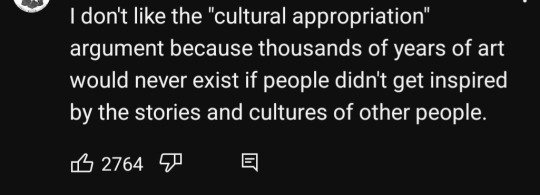
this is one of the top comments on the video essay above and, in my not at all humble opinion, it is a bad faith argument. on the surface the person is stating something it's hard to disagree with whereas what they really do is dismiss the concerns of the people complaining that their cultures are being stolen, trivialized and sold back to them. now, instead of talking about harmful structural problems in publishing that favors books by anglophone authors instead of translating and promoting foreign works, we're centering the conversation on a cosmopolitan author figure who contributes to Art and Culture by getting "inspired" by the cultures of other people - while willfully ignoring that this "inspired" author is almost always american, british or at the very least a native english speaker.
this is of course a nuanced issue and the solution isn't banning all authors from ever writing outside of their own culture. however, i do believe that in order to make the situation less unjust for authors and readers whose cultures popular anglophone authors like to borrow and profit from we need to acknowledge that something unjust is indeed happening and we need to recognize this injustice for what it is - cultural appropriation. even if the term offends the sensibilities of a reader who loves greek myth retellings or of an aspiring author who plans to write their very own fantasy inspired by eastern european folklore one day.
#book tag#greek myth retellings#cultural appropriation#booktube#will i regret posting this i wonder#in any case reblogs are appreciated#Youtube
28 notes
·
View notes
Text
i dont wanna like make a statement of fact. but i think some of the problems with the shitty modern retelling of greek myth&literature is that they see gods and figures as characters instead of. ways of understanding the world. like. the bible has characters in it but it is a way of explaining why the world is the way it is & a text as a foundation for a religion foremost. and i dont think it's BAD to go with myth and humanize figures. it's just like. hades wasnt a human guy & the myth of persephone is a way of understanding why seasons happen. you cant track their character across myth the same way you can track monica from friends you know it's not one cohesive narrative it's a system of belief
#june.txt#i might be off base i dunno#but like. it's a system of religion and it's a part of culture#theyre not Blorbos#also i dotn know the complexities of the bible i was raised by staunch atheists#sorry
40 notes
·
View notes
Note
Hello! In the wake of Lore Olympus’s end I went back a re-read some of it and one thing that I didn’t know I had such a problem with was THE FOOD.
Seriously all the food in Lore Olympus is either a png, a peice of bread or a mass of green stuff we are to assume is lettuce or something. Like when I read Alex Part 2 I remember being shocked at seeing real fucking food 😭😭😭 thank you for actually drawing food. ❤️
haha there are edits we've done in the community where we've given Persephone actual food! it's definitely weird for there to be so little food in the comic, especially when it's a Greek myth retelling. It's apparently canon that Persephone lives on a high-sugar diet, but that still doesn't explain why she's eating like a squirrel 😭😆 (plus she never told Hades this in the comic so like??? Man is deadass preparing himself a steak and leaving her with tiny ass tarts LOL)
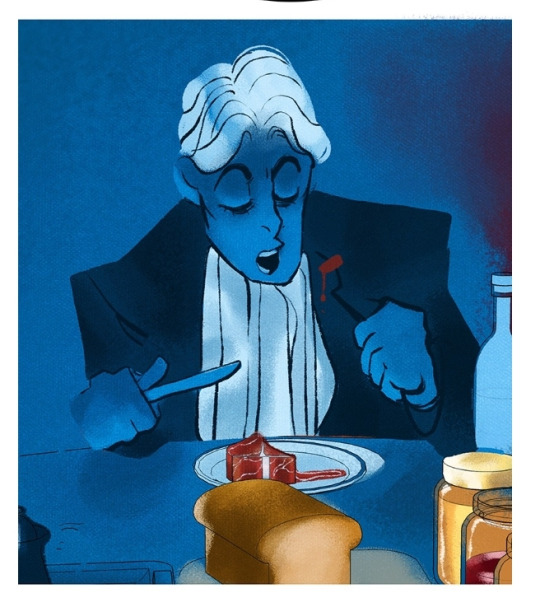
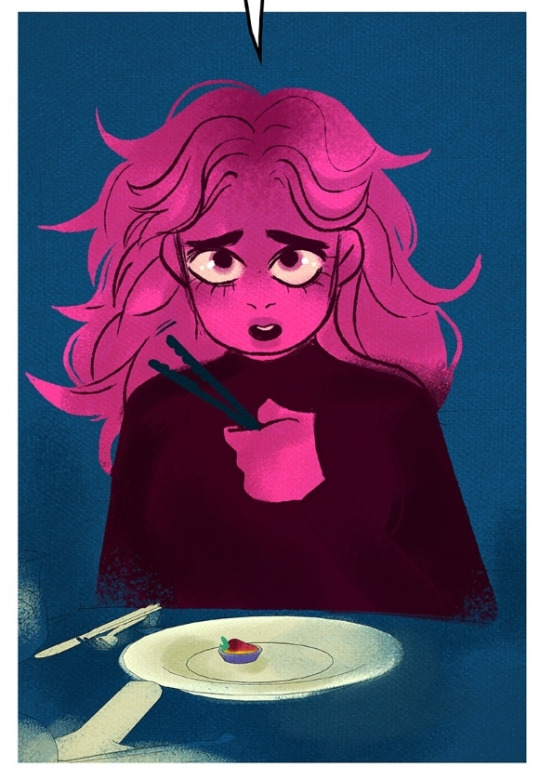
Plus for some reason Rachel tries to do the joke of "haha vegetarianism is so different and looked down upon!" but that makes zero sense in the context of LO, a Greek myth retelling, because the Mediterranean diet is predominantly plant-based. Like, it's really not any sort of counter-culture thing to be a vegetarian in Greece like it has been in, say, America, which is clearly where Rachel gets like 90% of her inspiration and influences.
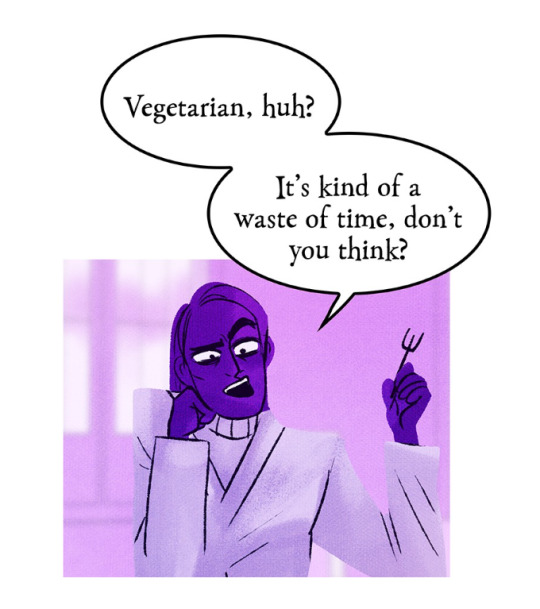
Anyways here's one of my own edits where I gave Persephone an actual meal LOL Let the poor girl eat 😭
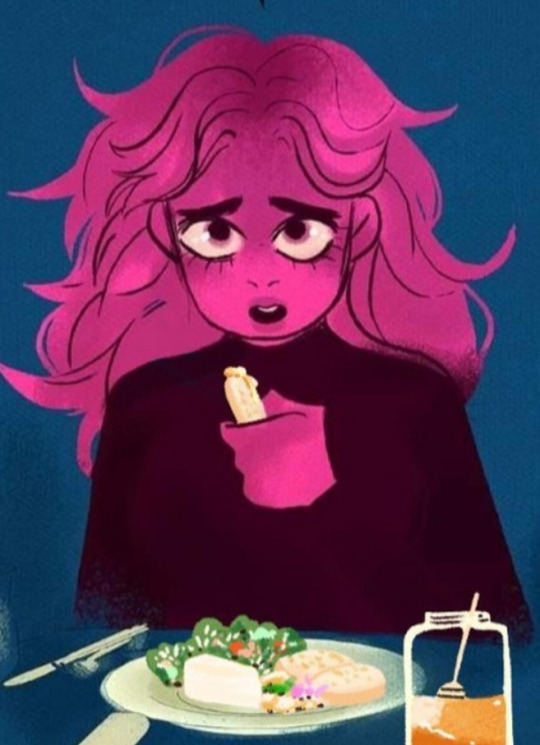
#ask me anything#ama#anon ama#anon ask me anything#lore olympus critical#anti lore olympus#lo critical
159 notes
·
View notes